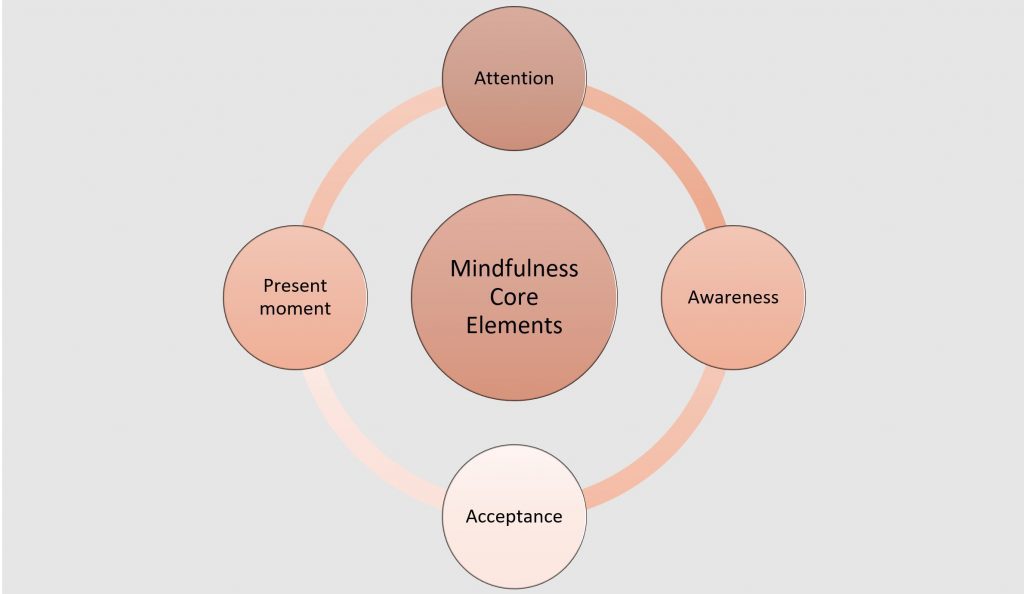The Power of Mindfulness-Based Coaching: Elevating Engagement
As defined by Jon Kabat-Zinn, mindfulness is the awareness that arises through “paying attention, in a particular way: on purpose, in the present moment, and without judgment.” Mindfulness is a valuable asset in coaching, facilitating a greater sense of emotional balance and well-being and enhancing the coaching relationship.
What do coaches need to consider when implementing mindfulness-based coaching? Four key elements (Image 1) are at the core of mindfulness and can be applied to coaching: awareness, attention, present moment, and acceptance.
Image 1. Elements of Mindfulness
(Image credit: Maria Benzo, PCC, MD, MS)

Awareness
Awareness is the brain’s ability to constantly monitor and recognize internal and external stimuli. A coach who embodies mindfulness within the coaching session can reach higher levels of listening, going beyond words. Increasing awareness allows you to recognize what is happening with yourself and the client. A mindfulness practice fosters self-awareness, allowing you to be more grounded and in tune with yourself, helping identify the inner critic often present in coaching sessions.
Attention
Attention is the brain’s ability to concentrate on a specific phenomenon. Mindfulness trains the mind to focus and refocus when distractions, like a train of thought, a sensation, or any external stimulus, arise. As you refine your skills in coaching, you can become adept at refocusing attention on the client rather than being easily distracted by other stimuli.
Present Moment
The present moment refers to being in the now, the only place where we exist, experience, and act. A coach who is fully present can hold a sacred space for clients to feel supported. Pausing to be in the present moment can seem controversial to your impulse to move the client forward, but pausing for silence and reflection can be golden.
Acceptance
Acceptance represents our ability to observe and absorb reality as is without judgment. Mindfulness helps you meet the client where they are, with an accepting stance that promotes safety and trust. Accepting what is certain does not mean avoiding appropriate action when needed or not standing up for yourself.2 Developing a mindfulness practice helps you be curious not judgmental, fostering understanding and supporting the client while staying non-reactive to your own thoughts and emotions. This allows the session to stay focused on the client.
Mindfulness facilitates the process by which individuals manage the influence of emotions. This emotional management allows for a more objective view of events and higher control of responses.
How Mindfulness Enhances Coaching
Mindfulness can enhance a coaching practice in four specific ways. The first three refer to the coach having a personal mindfulness practice, while the last one involves implementing a mindfulness approach during coaching sessions.
- Prepare for a Session: Practicing a brief mindfulness exercise before a session can help you leave behind thoughts, pressures, and anxieties of the day, allowing you to be present in the moment as you enter the session.
- Maintain Focus: An established mindfulness practice enhances your ability to focus on the client throughout the session.
- Remain Emotionally Detached: A coach with an established mindfulness practice can manage changing moods and emotions during a session, cultivating equanimity to focus on the client. It allows you to empathize while providing constructive challenges.
- Use mindfulness techniques: Introducing mindfulness practices to clients allows them to focus their attention on what they consider important, expanding their self-awareness and providing strategies to better manage their emotions.
Mindfulness enhances coaching engagement by helping you improve attentional focus and emotional regulation during coaching sessions. It strengthens the coaching relationship, improves the well-being of both coach and client and facilitates positive client outcomes.


